Key takeaways:
- Venture capitalists provide not only financial backing but also mentorship and industry insights, which are crucial for startups’ success.
- The significance of social innovation lies in its ability to address systemic challenges and foster collaboration across sectors.
- Evaluating venture capitalists involves considering their focus on both profitability and social impact, adapting strategies to contemporary societal needs.
- Building authentic relationships with venture capitalists can enhance creativity and lead to more meaningful partnerships.
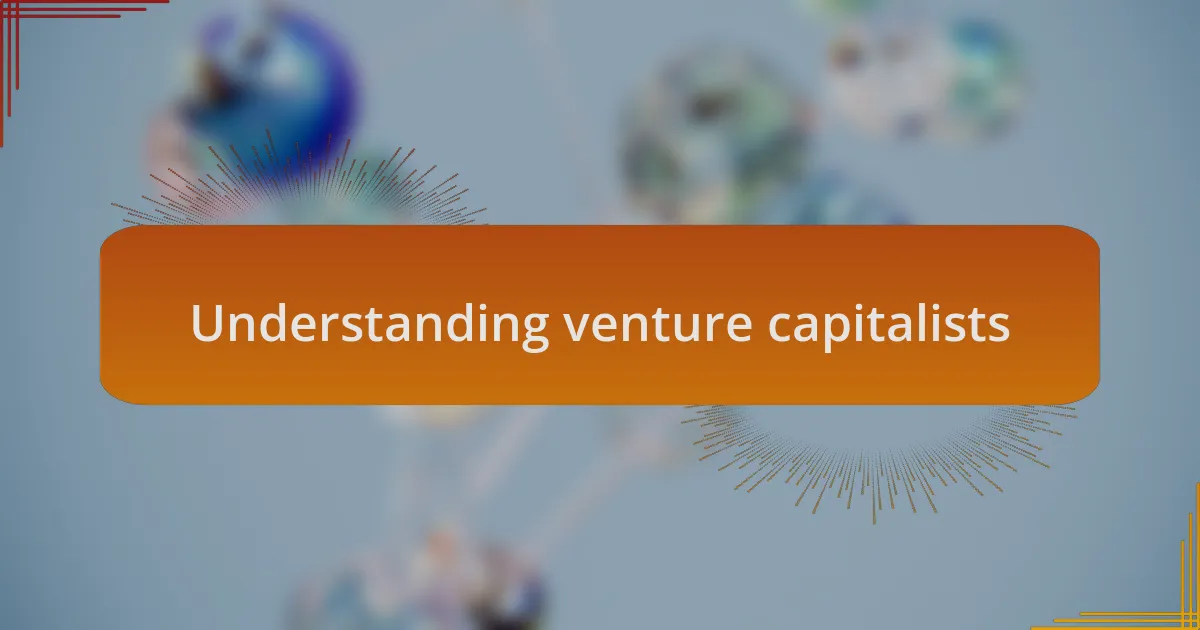
Understanding venture capitalists
Venture capitalists are individuals or firms that provide financial backing to early-stage startups, often in exchange for equity or ownership stakes. I remember my first encounter with a venture capitalist; it was both exhilarating and daunting. Their sharp focus and the way they analyzed business proposals made me realize that, behind the numbers, there’s a keen interest in the potential for innovation and impact.
What struck me most was their willingness to take risks on unproven ideas. Have you ever wondered what drives them to invest in startups that are essentially just a vision? For many venture capitalists, it’s the thrill of discovery and the chance to support groundbreaking solutions that can transform industries. They see potential where others might see uncertainty, and it’s that unique perspective that fuels the engine of innovation.
Often, they act as more than just financiers; they can be mentors and advisors, guiding entrepreneurs through the complexities of scaling a business. I’ve witnessed this firsthand when a friend’s startup received funding; the guidance they received helped refine their product and strategy. So, in the world of venture capital, it’s not just about money; it’s about fostering relationships that can lead to transformative change.
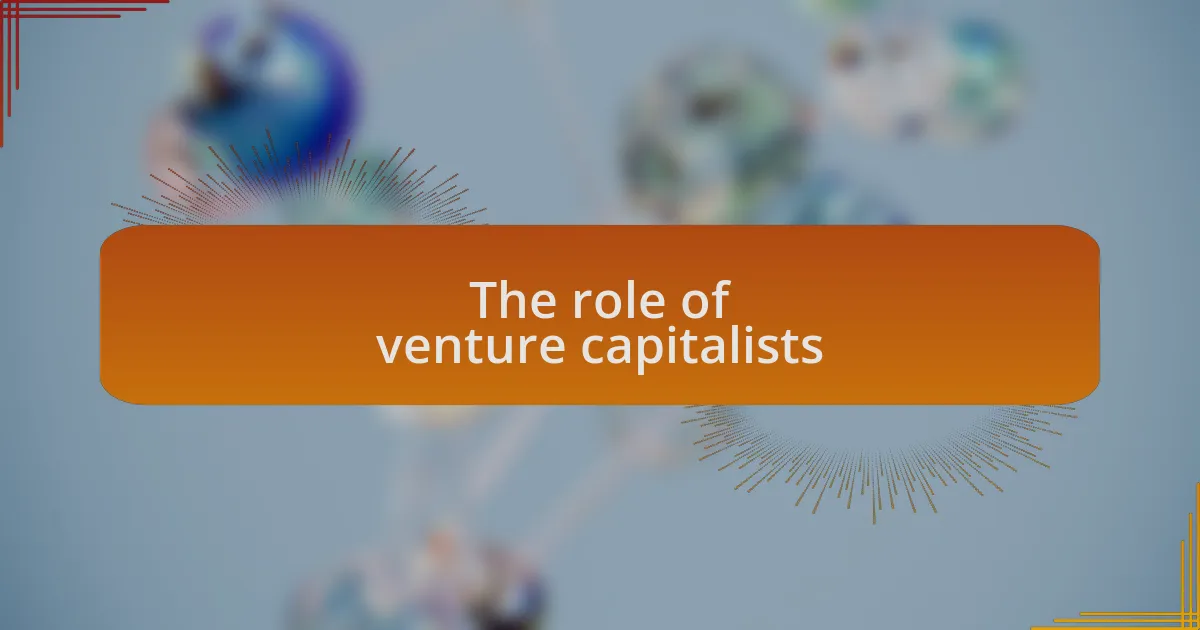
The role of venture capitalists
Venture capitalists play a pivotal role in shaping the startup ecosystem by not only providing essential funding but also by offering critical industry insights. I recall a time when a startup I mentored struggled to find its footing. The founder connected with a venture capitalist who not only injected funds but also shared invaluable advice that connected the dots between their idea and market demand. It’s this blend of financial support and strategic mentorship that enables startups to realize their vision.
Their influence extends beyond money; venture capitalists often help forge connections within their networks. I know of one entrepreneur who landed a major partnership simply because their investor introduced them to a key player in the industry. Isn’t it fascinating how a single connection can alter the trajectory of a business? This emphasizes that venture capitalists are like conductors in an orchestra, harmonizing various elements to create a symphony of success for startups.
Furthermore, the expectations that come with venture capital investments are significant. The pressure to deliver returns can sometimes lead to difficult decisions, such as pivoting a business model or scaling rapidly. I’ve seen startups thrive under this pressure, yet it’s also a reminder of the fine balance between ambition and sustainability. Through these experiences, I’ve come to appreciate that while venture capitalists are essential partners, their involvement often requires entrepreneurs to navigate a complex landscape of opportunity and risk.
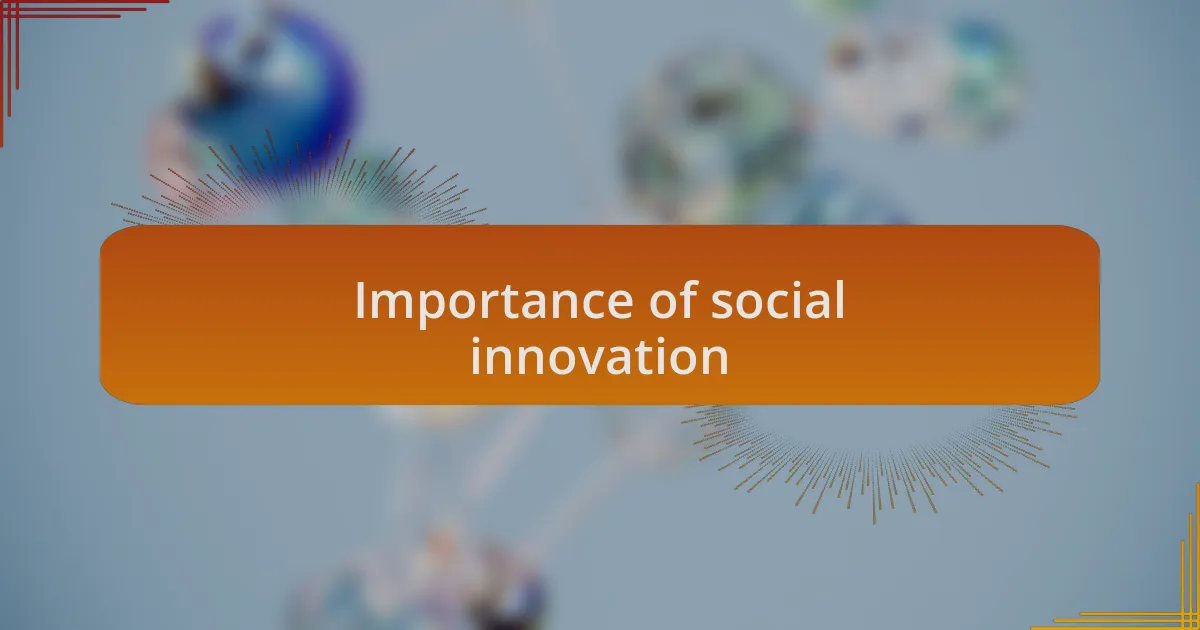
Importance of social innovation
Social innovation is crucial because it addresses societal challenges in ways that traditional methods often overlook. I remember a nonprofit I worked with that aimed to reduce food waste; they developed an app connecting restaurants with local shelters. Seeing this solution not only reduced waste, but also provided meals to those in need was incredibly rewarding. It made me question, how many other systemic issues could be tackled with innovative approaches like this?
Additionally, social innovation fosters collaboration across sectors, creating a vibrant ecosystem where ideas can flourish. I once attended a conference where social entrepreneurs, academics, and corporate partners came together to brainstorm solutions for clean water access. The energy in the room was palpable, reminding me that when diverse minds unite for a common cause, the potential for impactful change multiplies. It’s amazing to think about what can happen when we break down silos and truly work together.
Moreover, the long-term benefits of social innovation extend beyond immediate results to reshape societal norms and behaviors. My experience mentoring a group of young innovators highlighted how their projects didn’t just aim for profit; they instilled a sense of responsibility and community engagement among their peers. This notion of creating a culture of social consciousness raises an important question: how can we inspire the next generation to continue this vital work? By prioritizing social innovation, we not only tackle pressing issues but also empower future leaders to drive positive change.
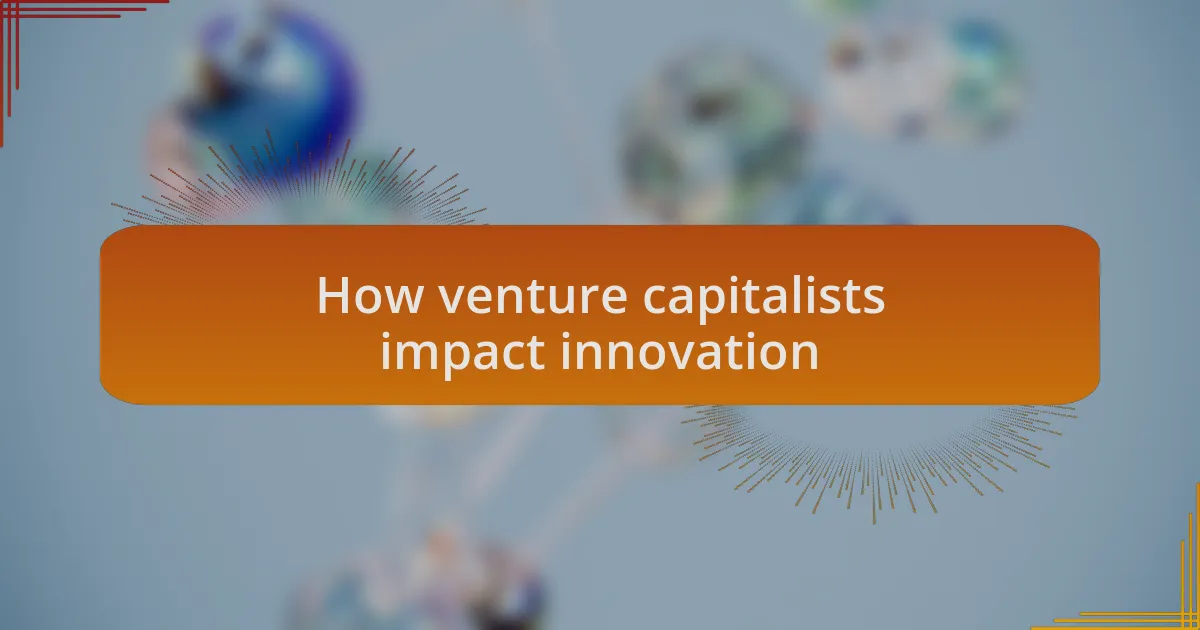
How venture capitalists impact innovation
Venture capitalists play a pivotal role in steering the course of innovation by providing the necessary funding for groundbreaking ideas. I recall a startup I encountered that focused on renewable energy solutions but was struggling to attract early investment. When a venture capitalist saw the potential in their vision, everything changed. It made me realize how critical that financial backing can be—not just for growth, but for validating concepts that can shift entire industries.
In my experience, VCs often serve as more than just financial supporters; they become mentors who challenge and refine innovative ideas. I attended a pitch session where a young entrepreneur showcased a wearable technology designed for health monitoring. The questions raised by the investors pushed her to rethink her product’s features, ultimately enhancing its market fit. It’s a powerful reminder of how these interactions can enhance innovation, transforming fledgling ideas into market-ready solutions.
Furthermore, the influence of venture capitalists on innovation can create ripple effects throughout the economy. I once worked with a social enterprise that, after receiving adequate VC support, managed to scale its operations dramatically. This not only expanded its reach but also generated jobs in underserved communities. It left me pondering: how many innovations could have thrived if they had just the right support? Venture capitalists have the ability to turn possibilities into realities, impacting lives well beyond their initial investment.
Evaluating venture capitalists’ strategies
Evaluating the strategies of venture capitalists requires a closer look at their decision-making processes. I remember sitting in on a board meeting where a VC expressed their criteria for investment: they focused not just on potential financial returns, but also on the social impact of the businesses they funded. It struck me that a solid strategy incorporates a dual lens—profitability paired with purposeful innovation. How often do we see this balance, and what happens when it’s overlooked?
Another interesting aspect is the way VCs conduct due diligence. I once worked alongside a team evaluating funding proposals, and I noticed that successful investors sought comprehensive insights beyond financial health. They explored the founder’s vision, team dynamics, and market fit. This multifaceted approach made me realize that a well-rounded evaluation can lead to smarter investment decisions and ultimately foster sustainable innovations. If we’re not assessing these areas, how can we truly gauge a venture’s potential?
Moreover, the evolution of venture capitalist strategies in response to social trends is noteworthy. I once reflected on a conversation with a seasoned VC who highlighted how they adapted their portfolio to include more environmentally friendly startups. This shift is not merely trendy; it shows a responsive strategy rooted in contemporary challenges. Are we considering the evolving landscape of societal needs when we evaluate venture capitalist strategies? It’s an essential question that may define the future of innovation itself.
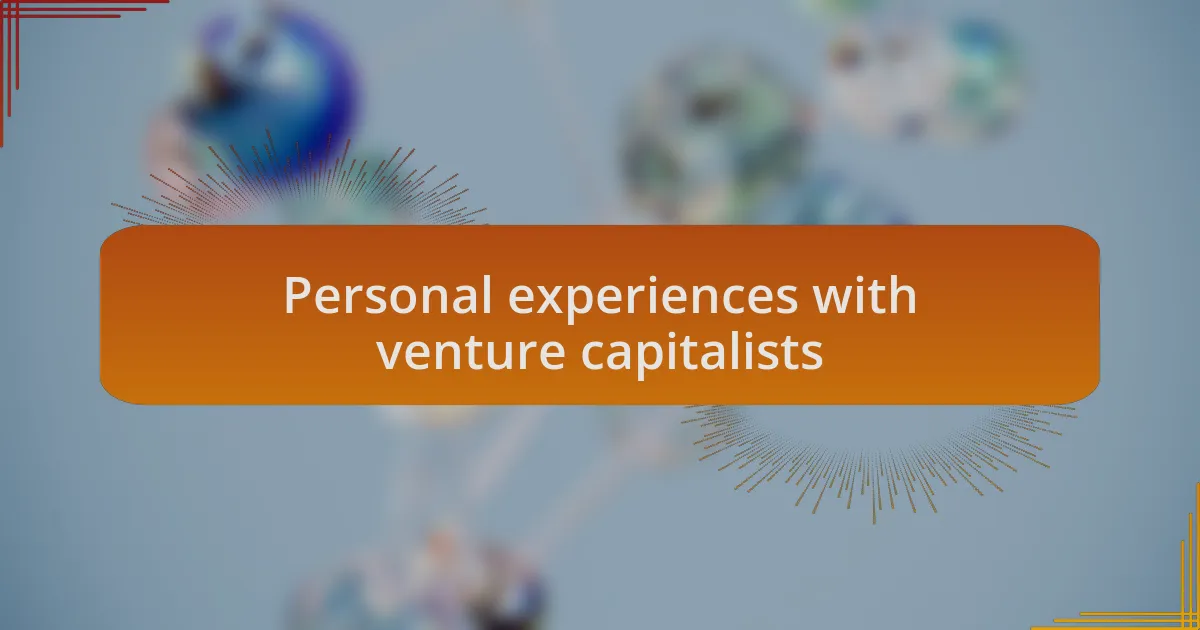
Personal experiences with venture capitalists
I had the chance to pitch my startup idea to a group of venture capitalists, and I was struck by the mix of skepticism and curiosity in the room. One VC leaned forward, intrigued not just by the numbers, but by the impact my project could have on the community. That moment reinforced my belief in the necessity of aligning financial returns with social value—how often do we think about the broader implications of our work in the face of funding?
During that same experience, I learned the importance of storytelling in dealing with VCs. I vividly recall how one of the investors shared a personal connection to the mission behind my project, revealing that their own family had faced similar challenges. It reminded me that behind the business jargon, we are all human, driven by experiences and passions. Doesn’t it make you consider how personal narratives can open doors to deeper connections in the venture space?
Moreover, I witnessed firsthand how venture capitalists can either uplift or stifle creativity within startups. After a tough negotiation session, I left feeling that some VCs prioritize control over collaboration. This left me pondering—how can innovation thrive in environments where the funding source leans heavily on protecting their stake rather than nurturing the creator’s vision? The dynamic between capital and creativity is a delicate dance that, when misaligned, can hinder great potential.
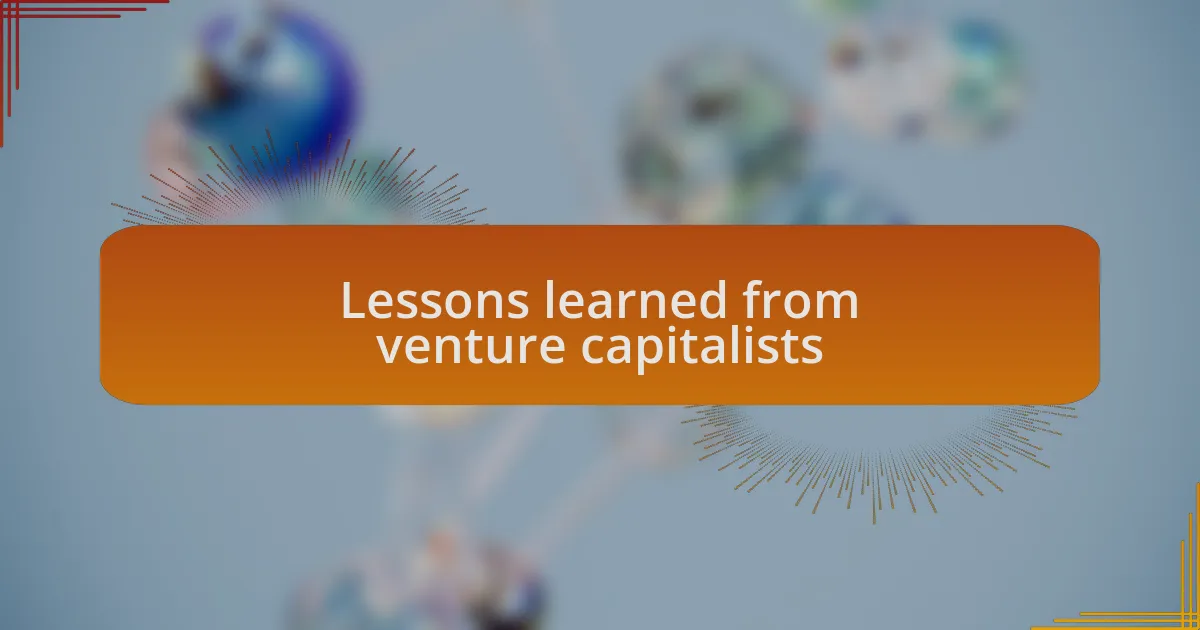
Lessons learned from venture capitalists
Reflecting on my interactions with venture capitalists, I learned that adaptability is essential. During one pitch meeting, I noticed how quickly the mood shifted based on the VCs’ questions. It emphasized for me that being flexible and ready to pivot your approach can make all the difference. Have you ever prepared extensively only to find that your plan needed a swift adjustment? I definitely felt that pressure.
Another significant takeaway was the power of due diligence. One investor grilled me with questions not just about my business model but about the potential societal impact as well. This taught me that VCs often look beyond the numbers; they seek sustainable ventures that align with their values. It’s fascinating, isn’t it, how deeply one’s mission can resonate when presented with data that tells a compelling story?
I also came away with a heightened awareness of the importance of building relationships over simply securing funding. I remember a follow-up meeting where one VC explored my values and vision, expressing genuine interest in my journey. That connection felt refreshing and reminded me that establishing trust can lead to more fruitful partnerships. How many opportunities might arise from just being open and authentic in our discussions?